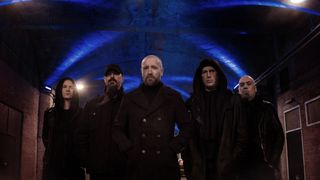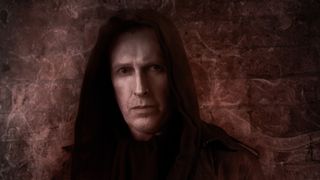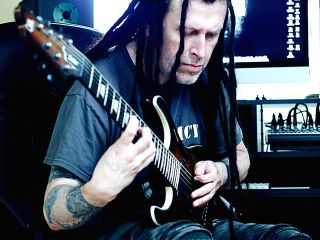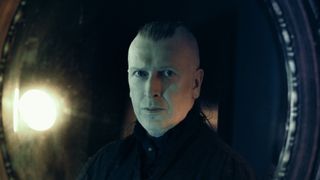There's never a bad time for a new Paradise Lost album, surely the most consistent British metal band since Iron Maiden. And yet the current worldwide climate seems the perfect environment for the band's 16th release, the none-more-black titled Obsidian.
While continuing to exhibit the death and doom metal influences of their formative years that made a comeback on 2015's The Plague Within, it's an eclectic journey that takes in elements from across the Yorkshire legends' three-decade-long career.
After one of the band's heaviest releases in 2017's Medusa, guitarist Greg Mackintosh explains that he and singer Nick Holmes deliberately approached the new record with a more varied approach in mind.
"All the tracks have goth tinges on there"
“For Medusa I wanted to do a full-on doom metal album with caveman drums and fuzzy guitars," the Yorkshire musician explains. "So then we when we approached this one we wanted to do something eclectic, more refined with more layers and textures to it, guitar-wise. We just went through it track-by-track to see what happened.
"A couple are more abridged tracks from the last album, a little classic Paradise Lost. Some are more 80s goth inspired because I was going through more of a phase of reminiscing about that annoyed that there are no goth clubs anymore. All the tracks have goth tinges on there, but then you have Ghosts, Forsaken and Hope Dies Young that are like going to a goth club and hearing a more upbeat Sisters Of Mercy or Cure song.”

Naturally, this obsession with the 80s goth scene has played a prominent part in the band's identifiable sound, particularly gaining a foothold on appropriately-titled second album Gothic. But while the marriage of styles has proved to be an intoxicating and highly influential blend, Greg reveals that it was so alien at the time of release in 1991 that not even their label wanted to put out what would become an iconic album.
"When we got onto the second album we thought we'd try out stuff that we like; Sisters Of Mercy, The Cure's really early stuff, Siouxsie And The Banshees"
“When we first got together it was because of mine and Nick's love of death and doom metal,” he reminisces. “We got our record deal with Peaceville, which we couldn't believe we got, and then when we got onto the second album we thought we'd try out stuff that we like; Sisters Of Mercy, The Cure's really early stuff, Siouxsie And The Banshees. We mixed it with the death/doom aesthetic on at least two or three of songs on Gothic.
“It paid off, but not initially. We had to travel to Holland to the distributors and talk them into releasing it because they didn't get it – 'We don't understand it, it's not death metal.' My recollection was that it was out for a few years before bands like Anathema began saying it was great, so I'm sure it took a while to catch on.”

And after revealing his favourite metal albums for us a few years back, Greg is marking the release of Obsidian by delving into the other side of his music collection and taking us through the peaks – or should it be depths – of the never fashionable but extremely resilient gothic music.
“It's a very dated, niche style of music. It'd be easy for it to go out of fashion as it's so stylized and so niche,” he says, fondly remembering how he discovered this alien form of music while also revelling in its more ludicrous charms in his dry, sardonic Northern humour.
“But it's one of those cult things that will hopefully continue and has endured in small pockets purely because of its stylised culture, how people look and dress and the sound of it, which is so despondent. It really was associated with teenage angst which is ironic as most people who listen to it now are in their 40s and 50s.”
Obsidian is out on 15 May on Nuclear Blast. To preorder visit paradiselost.co.uk
1. Sisters Of Mercy – First And Last And Always (1985)
“A lot of people's idea of goth is very different. A lot are just set in stone, like Sisters. Everyone knows them, they were played in every goth club everywhere. The First And Last And Always album is the one with Black Planet and Marian, is everyone's idea of what an archetypal goth album would be, even people who don't know what goth music is would guess at that. It's a mainstay of most people's collections if they're into that music.”
“I first heard it in a goth club called Adam & Eve's in Leeds, which was a goth club I guess, but there were some metallers and punks. Everything was mingled in together, but nobody talked to each other: you had your goth corner, metal corner and punk corner. And I was brought up with the punks, so until I was 16 or 17 when all the styles began to merge a little more you weren't allowed to go to the goth corner and talk to them. You weren't even allowed to mention that you liked goth, or metal!
“Maybe Walk Away was the first one I heard, or No Time To Cry, one of the more upbeat ones; I didn't hear Marian, which is my favourite on the album because I tend to like slower, more miserable stuff, until afterwards. I just thought 'What the hell is this?' as [Andrew] Eldritch's vocals were so over the top, almost comical, but it was great. But I wasn't allowed to admit it until about five years later.”
2. Siouxsie And The Banshees – Juju (1981)
“With some of these bands I actually like the 12” singles better. Like Israel by Siouxsie was one of my favourite tracks, but it wasn't on anything, it was just a single.
“Juju is probably the most solid album as far as Siouxsie goes. It's where they cemented that really mysterious, almost Eastern feel to their gothness. I just loved her voice, I still do. It's very unique and I don't think anyone's done it since either.
“On the new album we have very little female vocals, just on one or two tracks. On one of them, Hope Dies Young, we have some vocals that are basically a homage to Siouxsie, it sounds exactly like Siouxsie Sioux.”
3. The Cure - Seventeen Seconds
“I find it bizarre with The Cure's enduring hugeness, especially how Robert Smith looks. Looks shouldn't be an issue but looking like someone's grandma and still being cool to teenagers, it completely baffles me.
"There's a lot of Cure stuff that I can't stand, it's far too happy for me, I only like the miserable stuff"
“I know they're a fantastic live band, great musicians and songwriters, and that gives me hope for the music industry because it's usually style over substance, while with The Cure it's obviously substance over style, which is fantastic.
"We've played with them on a few festivals over the years and I'm always blown away by the inventiveness of their live shows and solidness of the musicianship.
“There's a lot of Cure stuff that I can't stand, it's far too happy for me, I only like the miserable stuff. But they've someone managed to keep cool, and I don't understand how that's occurred – I don't think they do! I love the way Robert Smith just takes it in his stride really.”
“Their first three albums are all miserable as hell, but I'd say //Seventeen Seconds// is probably the one. They're another one where I like certain songs from different albums – I like The Hanging Garden from Pornography – so it's difficult to pick just one album. But A Forest, which is one of their classic songs is on Seventeen Seconds, so I had to pick that; it's the one that says The Cure to me.
"They started to get a bit too happy after that record, much to my chagrin. But it gives me more to moan about.”
4. Dead Can Dance – Within The Realm Of A Dying Sun (1987)
“A huge, huge influence on Paradise Lost and me in general. Every album that we've ever done has had some reference to Dead Can Dance somewhere in the style. Nobody would ever spot it. Our third album, //Shades Of God//, is about as Sabbathy, Troubley and Candlesmassy as you can get, but a lot of is hugely influenced by Dead Can Dance, because I just used to listen to them on loop.

Interview: Greg Mackintosh on Paradise Lost's The Plague Within
“The album Within The Realm Of A Dying Sun is definitely my favourite, because of its relentless pomposity. But it's just so well done it never crosses that line into cheesiness, which is so easy to do with overblown music. It's one of those where I used to switch off, put it on, lay down and listen it.
"I would never say I'm a huge world music fan but I found out about so much from that album, such as Syrian music and melodies, through listening to Dead Can Dance. So even that has been an influence because it's so haunting.
“Lisa Gerrard's vocals are just insane, it's no wonder she went on to do what she did in the film industry, doing the Gladiator soundtrack and stuff like that.”
5. The Cult - Love
“One band you can't not mention, especially with Paradise Lost, is The Cult. Even before that they were Southern Death Cult and had a great song Moya, and then they became Death Cult and then The Cult.
"It's a tough one to choose a favourite album, especially from the goth stuff, because Dreamtime was a great album. But Love has more classics on it. You could put Rain on in a goth club and the dance floor would be packed.
“Just a great band and they were from Bradford originally. You can't go wrong with that: Sisters from Leeds, Cult from Bradford, keep it in the family. They were a big influence on a lot of our stuff. Some of Icon and Draconian Times was very, very influenced by the early Cult.”
6. Christian Death – Only Theatre Of Pain (1982)
“Rozz Williams's vocal style was completely ripped off – and not a lot of people know this – by Tom G Warrior on Into The Pandemonium"
“This one's a bit more obscure and wasn't played much in goth clubs. I absolutely love their album Only Theatre Of Pain. It's so frigging miserable it's unbelievable, in fact it's quite a hard listen at times because it's so miserable. It's not over the top in the way Sisters were and not too catchy in that sense either. It's more downbeat.
“Rozz Williams's vocal style was completely ripped off – and not a lot of people know this – by Tom G Warrior on [Celtic Frost's] Into The Pandemonium. When he's doing that whiny vocal it's lifted straight from Christian Death's Only Theatre Of Pain, and he probably doesn't want anyone to know that!
When I heard Into The Pandemonium and I heard that I knew exactly where it'd come from and I thought 'Yeah what a great idea, why not be influenced by that?'”
7. Depeche Mode - Black Celebration (1986)
“This is controversial because a lot of people wouldn't call it goth, but at this time I think was as it was when nu wave was crossing over into goth. But the lyrical matter, the name of the album, the melodies that are so discordant – some people would call it more electronic, but that doesn't matter to me: it's pure goth to me, I don't see how it can be anything else.
“It doesn't have the jangly guitars, but it has the same sentiment, same subject matter, same imagery and fucking great songwriting. In fact it's one where I wouldn't be able to pick a best song as every song is fantastic. Stripped, A Question Of Time... there's so many great songs.”
8. Bauhaus – In The Flat Field (1980)
“They weren't played too much and I wasn't a massive fan, but I loved some of the songs and especially this record. The main reason I'm including them is because they pretty much invented gothic music. For me they took it so it wasn’t nu wave anymore, where it crossed over. Some of it is very David Bowie, some of it in nu wave, some in post-punk.
“Peter Murphy's vocals are just great, full of emotion. It was just a lot deeper than what else was out at the time. Joy Division were as deep, they could be classed as goth but they didn't have the goth image to be classed in the same way. So Bauhaus' debut just deserves to be there for its notoriety and position in the whole genre, where it started.
“It's like the endless debate I have with Nick about who was the first black metal band. He always says Venom because they had an album called Black Metal, but to me that doesn't sound like black metal, it sounds like noisy heavy metal. But I would say Bathory are the first real black metal band. We've had this internal conversation for fucking 35 years. And a lot of people had this discussion about how was the first thrash band, because it was happening all across the world at different points.”
Obsidian is out on 15 May on Nuclear Blast. To preorder visit paradiselost.co.uk

